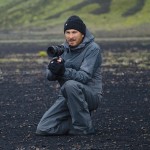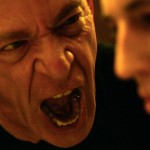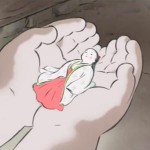Transcript
Darren Aronofsky, Director, co-writer Noah
Ari Handel, co-writer, Noah
March 14, 2014
New York Paramount Offices
Warning: Some spoilers in the conversation.
Patheos: Tell me about your personal relationship with this story. How did it come about?
DA: It started probably when I was 13, I was a public school kid in Brooklyn. I had a really great teacher who asked us all to take out a piece of paper and pen and write something about peace. I ended up writing a poem called Dove about Noah. It turned out it was a contest for the UN. I ended up winning it and having to recite it in front of the UN a few weeks later. And so, Noah has sort of been a patron saint of mine, in setting me down the path of creativity. When I eventually made the film Pi and was thinking about future films, I thought it was so weird no one has ever done the Noah story as a movie. In fact, it’s a little weird that the Bible epic as a genre has been dead for 50 years. There seems to be this new frontier there. Back in 2000 I started pitching it. In 2003 we started writing a draft. And then 2006 we set it up somewhere but it didn’t happen. And then after Black Swan, suddenly a lot of doors were open and my representation was like, you know you might be able to get that made. It’s kind of been a life long passion and adventure so far.
AH: I came to it when Darren, around 2003, said let’s do this.
DA: We were college roommates, Ari and me, Ari actually has a PhD in neuroscience. After college, he also got
Patheos: Was that at Harvard?
DA: We were roommates in college and then he got a PhD at ..(audio unclear)
DA: And then when he got his PhD, he was kind of wondering what he was going to do with his doctorate. Over those seven or eight years you were in training, I would always pick on Ari’s brain because he’s a neuroscientist and he’s really really smart. And he would always help us and I was like hey do you want to write something together and that’s how it all began between us as a collaboration.
Patheos: So let’s talk, the controversy, one of the controversies, is the environmental issue, and so what’s your reaction to people saying oh well the sin of Noah is not that he wasn’t an environmentalist.
DA: The sin of man was not that they were destroying the world.
Patheos: The sin of man. I misspoke, you’re right.
DA: That they weren’t destroying the earth.
DA: You just saw the film so you can see that surely there are issues about man’s violence against man, that’s really outlined in that war montage, there’s definitely man destroying, killing animals, brutally, that’s a part of it. And there’s also the sin of murder with Cain and Abel, I mean what happened is we looked at the Bible really really closely for clues and if you look at tradition, the Noahic laws, the seven laws of Noahic laws, which were the laws that came before the ten commandments, were set up after the flood. But before that, what were the laws? And there’s only kind of three rules we could find. The first rule was don’t eat from that tree, which we broke, and there was probably don’t kill, even though that wasn’t a rule before it happened, after Cain kills Abel, God was clearly upset with it. And there was a third rule which was all the green things in this garden are for you to eat. It’s in tradition that Noah and his family were vegetarians and didn’t eat from animals until after the Noahic laws. In fact, one of the Noahic laws is an interesting one, which is you can eat animals now but don’t eat live animals. Which made us go, what does that mean don’t eat live animals? That’s disgusting. It must have to do that before the flood, they were somehow brutally you know destroying animals. When you look at the story of Noah, he’s saving the animals. That’s what he’s entrusted to do. It’s not saving all the good people or trying to find the good people to put on the ark. He’s saving the animals, all two by two, he’s saving God’s creation. And like Pope Frances is now talking about, he was a steward of creation. And you know I think people are putting this political agenda on it, which isn’t really part of what we’re doing. We’re just trying to represent what is in Genesis.
AH: If you look, at what it literally says in the Noah story, of what the wickedness of man is, cuz, Obviously we went right there to figure out what’s going on, it doesn’t say very much, it says they corrupted the earth and filled it with violence, so obviously if they’re going to corrupt the earth, it has to be something that is pure in order to be corrupted. So the idea of corrupting a pure earth and the idea of filling it with violence, and we tried to very much show that violence, which I’m sure you saw the man on man violence, we see a corruption of pure earth. We’re just trying to find what is the story telling us actually happened.
Patheos: How important – I’m getting a sense of this – but how important was it to you to stay with the text and do you, is there anywhere in your knowledge where you went, where you feel like you didn’t adhere to the text?
DA: We, not making a joke now, the text was paramount, not talking about the studio, it was the final word on everything. We worked very hard not to contradict anything in the actual text. And if you go through the film, you can see there’s nothing that contradicts the text, but the text is four chapters long. There’s no way a two hour movie in those four chapters. In fact, Noah never even speaks in the entire, up till the flood is over, he doesn’t speak. How can you cast Russell Crowe, you can’t really make a silent movie with him. But there were clues, there were really interesting clues. The second thing that Noah does after the flood is he gets drunk. A lot of people forget that, but it’s the first mention of wine in the entire bible, and he’s naked and he doesn’t get covered by Ham. For us, it’s like, well that’s really interesting, maybe that’s not just one event, maybe something led to that.
AH: A relationship story
DA: A relationship. What type of relationship led to it. If you look at our movie, it’s a pretty well-woven thing. You follow Ham’s story back to him plucking the flower in that opening scene. A kid, you know, who’s curious. And where that leads in a situation that’s very difficult, where that relationship falls apart even though it’s a very loving relationship. We wanted to bring that to life. And we wanted to show, that when Ham goes off and is cursed and his descendants, you know, end up Nimrod and Babel, that this idea that yes, the first story after the flood is the tower of Babel, so it goes from restarting everything to the wickedness of man again. So for us, there’s this idea, it was like ok, clearly there’s this idea of what is good and what is wicked and how we go through these waves. So clearly Noah and his family was carrying the idea of wickedness. They had original sin in them. How do you portray that as a story? How do you bring that to life?
AH: And find a way to treat that mercifully as opposed to judgmentally, which at the beginning of the story, has this, you know, people are going to be punished for what they’ve done, and by the end there’s this notion that yes there’s still wickedness and also you have those temptations, but there’s mercy for that. And we’re not gonna punish the world, so you know,
DA: We were always coming back to the text and grounding in the text and looking for clues in the text. Whenever we got stuck, we looked for clues in the text.
Patheos: I was like, but he didn’t bring the wives on the ark, and then you got me. I was, like, I’m obviously not going to reveal, I was thinking, oh man they really deviated here, but you didn’t.
DA: It’s funny. We talked to a lot of religious people and I’m like ok tell me where we contradicted the text, directly contradicted the text. And there are a few things, a few lines, but basically, it’s very truthful and honorable of the original text. If you go through it, we did dramatize it.
AH: It is the way people have preconceived notions themselves of what the text may mean, you know, like with the wives.
DA: One guy was like, what about the fact he wasn’t 940 years old? And so you know we tried to sort of say, first of all, how are you ever going to do that? Everyone is going to be in age makeup? It’s silly, you know, to create a film like that. So we decided to say it predeluvian times, who knows how time was and what that aging was? And maybe they were that old, we don’t really know, but you know, we basically took the length of his life and divided it to a hundred year old man. And basically said at this point he’s 40 and at this point he’s 50.
AH: Noah died when he was 930, so he’s 500 years old when he has his children and the flood comes when he’s 600 years old. And maybe over a thousand years, that’s middle aged. And that seemed actually more realistic actually to being longlived, to just you know, the first 80 years you’re kind of young and then you become just kind of old.
Patheos: What about the …so this is, at least in my world, this is being discussed in religious circles, and but I’m almost wondering if the fact that it’s being in kind of the Christian right and Bible movie circles, do you want a broader audience, do you think the broader audience will be interested, do you think they’ll be turned away because it’s been “How Noah was blah blah blah.”
DA: For us, the film’s for everyone. It’s for believers and nonbelievers. And I hope it creates conversation between both sides. One thing I’ve noticed is how much anger there is out there between those two sides, just seeing some of the articles written on the internet and seeing comments, there’s a big battle, and I hope this film can actually make the conversation civil, it can bring people together to talk about these ideas. Because I think believers are not, if they let go of their expectations that this isn’t exactly how they imagined it, but actually look a little bit beneath the surface and look at the themes of this story, they’re going to see the same themes of hope, second chances, survival, family, they’re all values that I think believers find in the story and that definitely preachers and pastors can talk about it and relate it back to ideas that they’re trying to discuss. The exciting thing is that nonbelievers are going to get a film that ‘s an action filled exciting great, hopeful, warm top-notch actors in the world right now, bring these character to life, so that it’s, so they’re going to have a very deep entertainment that’s a family drama about a man who has an impossible task ahead of him and has to sort of accomplish it. It’s a superhero film in many ways, um so…
AH: And they can have the feeling that just because a story is in the Bible, doesn’t mean it’s a not story that they’re interested in, and those same themes that we’re talking about, they don’t have to have a religious stance to being completely invested in those themes as human beings because they’re universal themes.
DA: I do think we do want it to go to everyone.
Patheos: So talk to me a little bit about the Tubal-Cain character. He was a big surprise for me. Almost his laying out of theology. Where did that come from, his view of God, and man’s role in the universe?
DA: I think um, he’s a character named in the Bible, he’s a, if you follow the genealogies, he was alive at the same time as Noah, he’s described as the first worker of metal and weapons, and so he seemed like the right guy to sort of create a personification of the wickedness of man. But I think once again what was important to us is that we’re all descendants of original sin. You know, Adam and Eve are all of our distant ancestor. And so that original sin is in everyone and so we didn’t want to paint just a purely evil guy and a purely good guy. We wanted to discuss how all of us have temptations and how all of us have to make choices to do the right thing in our lives. What’s interesting is most of the time when you make a bad guy in a movie, if it’s a religious movie, you make the guy a nonbeliever or something. But that’s not the case. Everyone believes in God in this movie because god is ten generations ago. Adam is ten generations ago, creation was just ten generations ago.
AH: In his genealogy, Noah is the first person born after Adam died. So the idea that God doesn’t exist in the universe, it nonsense. So Tubal-Cain has a relationship with God, it’s just a negative relationship with God. He’s angry but he’s also, in that scene, he’s also looking for more. It’s complicated.
DA: There’s a lot of father son relationships going on here. Throughout the film, Noah and his sons and between the Creator and Noah, there’s a father son relationship but also between Tubal-Cain and his Creator, there’s relationship. But what was interesting to us is that God is not mentioned in the Bible in those ten generations after Cain. The last thing God does is he marks Cain and then you don’t hear about it until his heart is grieved because of the wickedness of man. For us that was a really interesting thing. There’s a big gap here of God’s presence. So how would a character who didn’t have God for ten generations feel? It’s interesting because Ray Winston would talk about it, as I was describing this relationship, he would say it’s kind of being a latch key kid who’s like left alone and burns down the kitchen and then the parent comes home and is really upset and the kid is like what did you want me to do I was here all alone. And that’s how he feels is that God has abandoned us and now he comes back and wants justice, that’s not fair, which for us was kind of a really cool theological idea. And just you know because people can look at this time now and go where is God in this world and what is our responsibility to God, so it relates to a lot of ideas that people are thinking about now.
Patheos: So I felt like –I’m trying to think – you left it open whether Noah had failed or not. Whether or not he was supposed to, or at least in his mind, it seems like he never really settled that, is that something you want people to wrestle with, kind of the sin, how dark humanity is?
DA: Well, I think, it is second chances, is kind of for me, what it is. There is an ambiguous end to the story if you think about it the next story is the story of Babel as I said, so we go right back to wickedness.
Patheos: You had it even on the ark they’re fighting, trying to kill each other, father against son.
DA: Yeah yeah yeah. We were just trying to play out that conflict. But for me, I think, what Eula says on the rock, maybe don’t print this, just for your own take, I think she’s sort of explaining that you were tested and you went through a test and maybe this is what you want. And I think with second chance comes responsibility and I think that’s kind of how Russell played it, sort of hope and responsibility and then that kind of rainbow cosmic image at the end is a new pact, like ok we’re going to try a second chance
AH: When you look at the Noahic laws and you look at the covenant that comes, theirs is an added responsibility, it’s that people are supposed to have courts, they’re supposed to judge themselves, they’re supposed to take a little responsibility for how they behave and for enforcing it. So I think there’s an ambiguity there but I think the solution of the ambiguity for Noah is, oh, maybe we don’t know, we’re not all good, we have dark tendencies within us but we can do a better job, we can do better, we have to better ourselves.
DA: See this is what we want, we want conversation, exactly what’s going, because I think there’s a lot of ways to think about the film and I think there’s a lot of nervousness about Hollywood but this is not a “Hollywood” movie, this is something that I’ve been passionate about my entire life and this is something Ari and I spent a decade studying and thinking about and trying to think about a way to bring it to life. There is no, like, agenda of some you know people trying to make money off of Bible stories.
AH: The only agenda is like these themes you’re bringing up, the relationship between man and God, the relationship between goodness and wickedness, mercy and judgment, We went to the story to find those themes of what those stories are about, what questions is it asking, why is Babel next? Is wickedness and goodness between people or in every person? Those are the questions we saw there and that’s what we were trying to bring forth into the film and dramatize and that’s what we’d love people to be talking about and not whether, you know….
Patheos: That’s what makes it challenging too.
DA: It is challenging. You know, it’s interesting because people have a lot of preconceptions about Noah, they think he’s all good, a good old man, but it doesn’t actually say that he’s good, it says that he was righteous in his generation. And there’s been a lot of Jewish thought for centuries about what that means, righteousness in his generation and what we sort of came away with is that righteousness is a good balance of justice and mercy. As a parent you may be able to understand that if you’re too just you destroy your child through strictness and if you’re too merciful you destroy your child through leniency. So being a good parent is about balancing justice and mercy, which is what Noah is. And at the beginning of the story of Noah, God is purely, purely vengeful and wants justice. And so we decided to sort of align Noah with that, that he is upset and wants justice for the world, and like the rainbow at the end, where god basically finds mercy and grace for mankind, Noah too finds mercy and grace, so we kind of gave him a similar emotional journey and then with the balance of mercy and justice, he actually is righteous in his generation.
Patheos: You took it down off the nursery wall, which I think needed to be done How much did you go back to older versions of the story. In the scene where the water first comes and they’re all on that rock of that reminded me of
DA: Doré
Patheos: Is that the woodcutting?
DA: Yes, exactly, that’s good you’re the first person to pick up on that.
DA: That’s called the Doré shot, actually, it’s named after, that’s what we called it.
Patheos: When the drop fell, it reminded me of the passion of the Christ.
DA: I don’t think I was referencing that. I..
Patheos: Were there other shout outs?
DA: We looked at every piece of art that’s ever been done on the Noah story that we could find. And it was really interesting it’s like, for instance the white dove is maybe four or five hundred years old. Before that the dove is different colors and stuff.
AH: It doesn’t say it was white and there’s lots of different kinds of doves.
DA: Like the ark is a perfect example. Most people picture this houseboat but if you actually look at this description in genesis, it describes a box, it tells you this many cubits long, and if you really think about it, it didn’t need to steer anywhere, it doesn’t need a keel. It was basically a storage device three levels big. That’s how it was described. If you look at our vision of what the ark looked like, it’s probably the most accurate of what’s been done according to Genesis. We tried to find a lot of artwork to help us but there’s very very few that sort of captured the magnitude of it because it’s been turned for a very long time into something comedic and for children and I think it’s because of the animals, it’s because of man saving the animals and that’s something kids can relate to
AH: I even think it’s something deeper than that, I think there’s something really scary in the story which is that God would think about killing all of the people. That ‘s a really dark thought and I think the reactions to that really dark thought is to put it under the rug a little bit and not think about that. There’s a way there’s a part of the story that people have turned away from by sanitizing it.
DA: You just gave me a flashback of my childhood, of hearing the story early on as a kid and being scared that that could happen again and I could not get on the boat. I just actually felt that for a second. Sorry I haven’t felt that for a long time.
I’ve long thought it was bizarre we put it up on children’s walls.
DA: It’s a very intense story. We wanted to capture the spirit of that and bring it to life because I think actually there’s a lot to get from that story. There’s a lot there. It’s a lot richer than just a nursery story, absolute faith, there’s lots of interpretations but it doesn’t usually get into the whole idea of wickedness and sin and goodness and grace, which is the stuff we were attracted to talking about.












